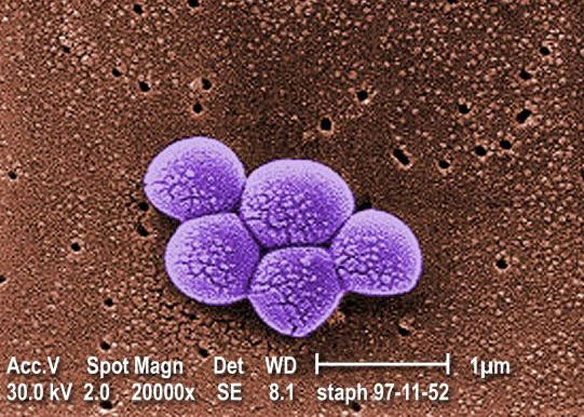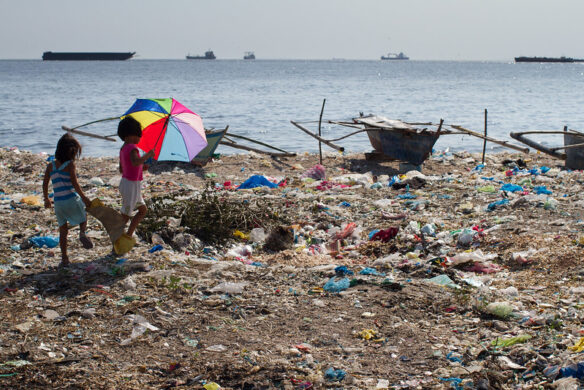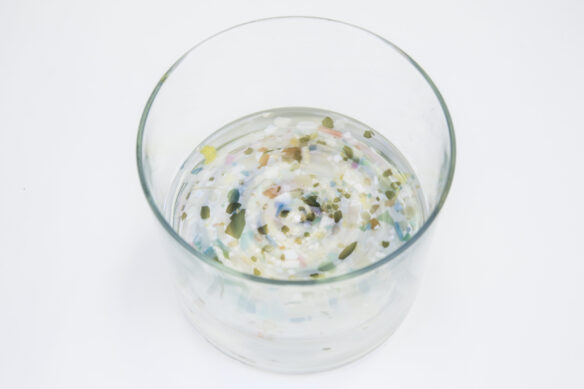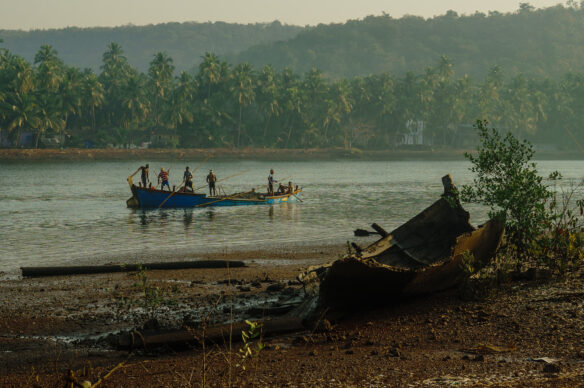By Sharlene Pilkey
It used to be swimmers ear, (otis exterma,) and then it was swimmers itch (cercarial dermatitis) if you went to the beach, everybody got it at one time or another, but now there is a new bully bacteria hiding on supposedly pristine beaches world-wide.
Fancy name of Methicillin resistant Staphylococcus aureus or MRSA for short. Anyone ever in a hospital has heard of it or been exposed to it, but now it has moved to recreational beaches, probably left on sand from other bathers. MRSA has become a very personal thing for me. My 24 year old grandson, an avid surfer, picked it up from one of the the northern beaches in Washington State. Small scratch on his leg didn’t look so bad. He was working for an electrical company which wired yachts. Leg was sore, he put anti bacterial medicine on it and figured it would clear up. Leg swelled more and was very sore, he soaked it in hot water, continued to go to work every day. Ran a fever, passed out at work, his boss took him to the emergency room where the wound split and the emergency room was contaminated, it was MRSA, a word he had never heard of before.
He has recovered and still surfs, but will have MRSA the rest of his life, taking medicine the rest of his life, with flare-ups from time to time. A stiff price to pay for a few hours of surfing on the cold northern waters where no one knew MRSA, usually found in hospitals, even existed.
It has only been in recent years that scientists have expanded their disease contamination studies to the beaches. The public knows (or should know) you don’t go swimming where sewer outfalls, septic systems, storm water runoff or industrial waste is discharged. But what harm walking or sitting on a sunny ocean beach, children building sand castles , burying themselves in the sand, or just wading in the water?
At an American Society for Microbiology meeting held in California in 2009, Dr. Marilyn Roberts, a microbiologist, and her team from the University of Washington in Seattle, reported their findings that at least five public beaches along the coast of Washington were contaminated with MRSA found on the sand and in the water. This same year , University of Miami researchers found staphylococcus in four out of ten ocean water samples collected by hundreds of bathers at a South Florida beach. Two beaches in California were tested by Dr. Roberts, but no MRSA was found. She stated that testing of the samples was delayed and that may have affected the quality of the test.
Not to worry said several California newspapers, no MRSA found on our beaches. Well, not exactly. In comments posted to the September 12, 2009 L.A. Times story on MRSA Glenn Rock said, “I live in La Jolla and swim almost every day in the ocean at the La Jolla Shores Beach. About a week ago my arm/shoulder were so badly infected that I went to the emergency room. I hadn’t hurt myself and it just came out of the blue. It turns out that I had a Staph (antibiotic resistant strain) infection. The lab at Scripps called me several days after taking some tests to tell me that my infection was very serious because of the resistance to antibiotics. Well now after 2000mg (4 horse pills) keflex a day and 2 huge pills of Bactrim, tons of creams, etc. prescribed ,my infection has gotten much better and hopefully will be all gone in the next 3 or 4 days.” Another comment asks if Dana Point Harbor in California has been tested as this family was there and five days later her husband was dead from MRSA sepsis/pneumonia.
It is pretty obvious that something is happening health-wise on our beaches. The incidence of infection is too wide spread. The present scientific point of view is that MRSA is probably brought to the beach by the public where it stays in the sand and in the water to be picked up by a beach user. The recommendation from health care people is to shower before you go to the beach and right after you have been to the beach, but how many of us do that?
No need to be alarmed, but be aware. Swim on ‘clean beaches’ if you can. Don’t swim with cuts, and encourage local governments to broaden their testing programs. With increasing world populations and the rush to the coast that is occurring all over the world, watching out for beach water quality becomes ever more important!
We already monitor for e-coli and other bacteria, and this has proven to be successful in alerting officials to close beaches. MRSA seems to have been ignored. It is time to broaden our monitoring programs to include MRSA and what ever other new forms of bacteria may be a health threat on our beaches.
MSRA Bacteria Life Span: Original Source
Staph bacteria are resistant to salt. Warmer temperatures and sunny skies, with their disinfecting UV rays, may also kill off more of the bacteria at the sand’s surface, she noted. But below top inches of sand and at the waterline, beaches across the country may be just as susceptible as those in cold, rainy Washington.
- MRSA can live for up to 7 months on dust
- MRSA can live for up to 8 weeks on a mop head
- MRSA can live for up to 9 weeks on a cotton towel
- MRSA can live for up to 203 days (over 6 moths) on a blanket
- MRSA can live on the skin of otherwise healthy individuals, with no symptoms indefinitely
- How Long Did It Take For MRSA Bacteria to Evolve?
- Maybe you were just reading about MRSA bacteria on the MRSA symptoms page and wondered how long it might take for a Multi Resistant bacteria to evolve.
- Are Florida Beaches Safe? Health Department Doesn’t Know
- On January 23, 2004, environmental documentary film maker Gary Burris of Goodland, Florida was shooting video at the northern end of Fort Myers Beach to continue reporting on his documentary “Deep Trouble: The Gulf in Peril.” Burris sat down in wet sand near the waterline and his pants became soaked with sea water.
- Superbugs of the New Millennium
- Community Associated Staph Infections a Growing Concern
- Infectious Superbug Invades Beaches
- Add the MRSA “superbug” to the list of concerns you bring to the beach nowadays, a research doctor said today.
Medical, Scientific, Informative Articles
- MRSA Found on Beaches in Washington
- VIDEO and Text. from the Interscience Conference On antimicrobial Agents , Doctor Marylin Roberts. (who is the lead scientist discovering the problem after studies on both coasts).
- Medical, clear, concise yet very well explanatory information about MRSA
- Recently discovered and studied
- Health Department Information and Recommendations
- The Most Lethal Superbug Epidemic Ever is Spreading Like Wildfire: Infectious MRSA Bacteria
- MRSA Signs and Symptoms
- Our results suggest that public beaches may be a reservoir for possible transmission of MRSA.”, the Puget Sound study, by Doctor Marylin Roberts
- MRSA Bacteria Found at Puget Sound Public Beaches
- Whether the source is human activity or the environment, beach goers should take precautions. The CDC recommends hand washing as the best defense against MRSA. Keep open wounds covered when going to the beach and avoid sharing towels. The actual risk of contracting MRSA at the beach is not currently known.” 2005.
- MRSA and Other Types of Staph Found in Ocean
- MRSA is resistant to common antibiotics such as penicillin and amoxicillin, which is one reason it is so potentially dangerous.
- New MRSA Bacteria Killer Registered by EPA
- MRSA is usually spread by direct physical contact with those already infected or through indirect contact by touching objects (towels, clothes, sports equipment, etc.) that infected skin has contaminated. Consequently, any heavily trafficked area can be a source of infection.
In The News
- Dangerous Staph Germs Found at West Coast Beaches
- A day at the beach? Shower afterward. Sand, water can hold dangerous staph germs, study finds
- MRSA discovered at five public beaches
- Dangerous staph bacteria have been found in sand and water for the first time at five public beaches along the coast of Washington, and scientists think the state is not the only one with this problem.
- MRSA ‘superbug’ found in ocean, public beaches
- Lance Peterson, a University of Chicago infectious disease specialist who was not involved in the study, says, “Staph is a salt-loving organism. It’s not surprising to see it in the ocean.
- MRSA on the beach?
- Next time you go to the beach, you might want to shower – before you get in the ocean as well as after, says Dr. Lisa Plano, associate professor of clinical pediatrics and microbiology and immunology at the University of Miami.









